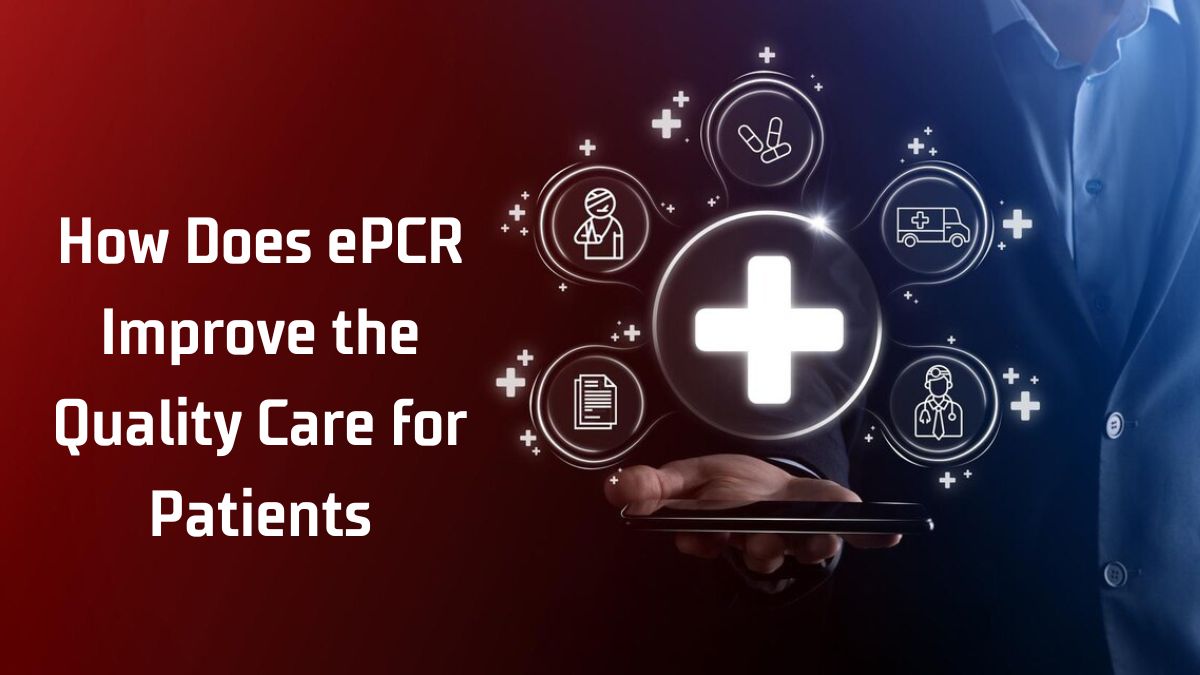How Does ePCR Improve the Quality Care for Patients

How Does ePCR Improve the Quality Care for Patients
Speed and accuracy play a crucial role in the healthcare industry. When faced with medical emergencies, paramedics, nurses, and other healthcare professionals need to act fast to ensure that their patient’s condition doesn’t worsen. However, before they can administer the right treatment, they’ll need to collect important patient data to learn about their medical history, status, and overall health.
Traditionally, this process was written on paper. Unfortunately, this method isn’t always completely reliable. Paper-based patient care records are more prone to errors due to the variations in handwriting. They’re also time-consuming because the process of writing, storing, and retrieving data was all done manually.
To streamline and modernize the process, many medical facilities have integrated ePCR (Electronic Patient Care Reporting) software into their healthcare system. With this technology, healthcare professionals can ensure that they’re providing their patients with quality care.
What Is ePCR Software?
ePCR software functions as a comprehensive electronic health record system that documents a patient’s information and the care that was provided during emergency medical incidents. It can be tailored to the specific requirements of EMS professionals and healthcare providers, so an ambulance ePCR software, for example, is customized to suit the needs of paramedics and EMTs. In addition, this digitized system can streamline the following processes:
Data Collection. ePCR software enables healthcare providers to collect a wide range of patient data and save them in the system fast. This includes the patient’s personal information, medical history, and details about the nature of the emergency.
Assessment and Treatment Documentation. Healthcare providers can document their findings, interventions, medications administered, and medical procedures performed in the software. This detailed documentation provides a comprehensive record of patient care.
Data Transmission. Some ePCR systems include data transmission capabilities, allowing for the seamless exchange of patient information between healthcare providers. These tools help ensure standardized and evidence-based care.
Moreover, with ePCR software replacing handwritten patient care reports, healthcare providers can complete the documentation process more efficiently. Medical professionals no longer have to deal with any paper and thus can spend more time focusing on patient care.
How Can ePCR Improve the Quality of Care for Patients?
Although ePCR systems are mainly designed to optimize the workflow of healthcare providers, they can also improve the quality of care that patients receive. For one thing, ePCR facilitates better patient tracking, which enables healthcare providers to track each step of a patient’s journey and ensures that they receive continuous and proper care. Even as their patients transition through various healthcare settings, they can keep an eye on their status in real time. This process enables smoother handovers between EMS teams and hospital staff, reducing the risk of information gaps or miscommunications. Enhancing patient tracking also leads to more coordinated and effective care, improving patient outcomes. Apart from this, ePCR can improve the quality of care for patients in other ways.
Improved Patient Safety
Patient safety is of paramount importance in healthcare, and ePCR software plays a vital role in enhancing it. As mentioned earlier, this system enables medical professionals to create, update, and keep detailed records of their patients. By having a more comprehensive documentation process, healthcare professionals can make more informed, evidence-based decisions, reducing the risk of adverse events and complications.
The transition from paper-based patient care reports to ePCR software also brings a substantial improvement in the accuracy and legibility of data collection. Illegible handwriting has long been a challenge in healthcare documentation, leading to potential misinterpretation and errors in patient care. With ePCR software, however, healthcare providers can eliminate this issue. This is because the system digitizes the patient’s data, which ensures that all information is clear, legible, and free from the ambiguities associated with handwritten notes. This improvement in data quality promotes more accurate decision-making and precise medical interventions, therefore enhancing patient safety.
Enhanced Quality Assurance and Research
Many ePCR systems often include advanced reporting and analytics tools that allow healthcare organizations to review and analyze their performance. By aggregating and analyzing data from a wide range of patient cases, healthcare providers can identify trends, best practices, and areas for improvement. This data-driven approach aids in refining care protocols, enhancing training, and optimizing resource allocation. Moreover, it can be a valuable resource for medical research contributions to advancements in medical science and patient care practices.
Increased Data Security
ePCR software recognizes the importance of safeguarding patient information. That’s why ePCR systems come with robust data security measures that comply with the regulations set by the Health Insurance Portability and Accountability Act (HIPAA). This increased data security not only preserves patient confidentiality but also prevents unauthorized access and potential breaches. Patients can trust that their sensitive health information is kept safe, further enhancing the quality of care by maintaining privacy and data integrity.
Despite the digital nature that ePCR brings to the medical record-keeping process, it provides tangible improvements to the quality of care for patients. By allowing healthcare professionals to document and monitor a patient’s status quickly and accurately, they can provide them with the right care in an efficient and timely manner.
Also Read: How to Develop a Doctor Appointment Booking App for Your Clinic


